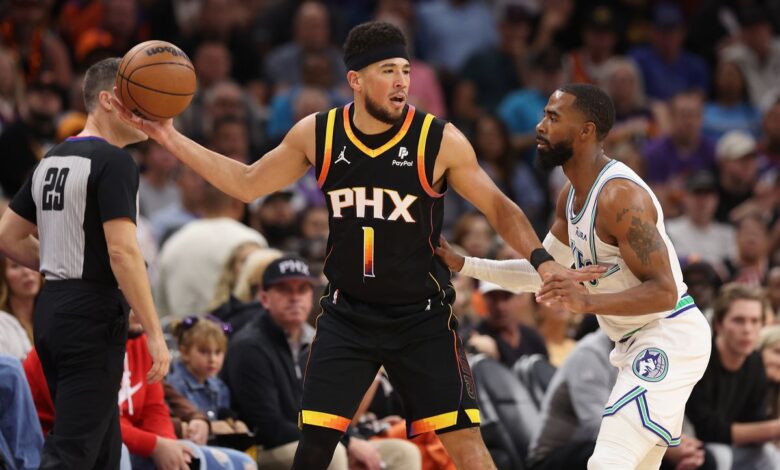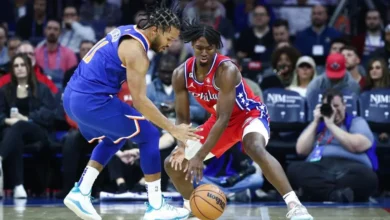Phoenix Suns vs Timberwolves Match Player Stats

The Phoenix Suns and the Minnesota Timberwolves delivered a thrilling matchup that captivated basketball fans everywhere. As I watched the game, I was struck by the impressive performances from both teams. The Suns, known for their dynamic offense and strategic play, went up against the Timberwolves, who brought their own brand of aggressive defense and potent scoring. In this article, I’ll dive deep into the player stats from the game, offering a comprehensive analysis of how each player’s contributions influenced the outcome. Whether you’re a fan of the Suns, the Timberwolves, or just a basketball aficionado, this detailed breakdown will offer you insights into the key performances and their impact on the game.
Game Overview
The clash between the Phoenix Suns and the Minnesota Timberwolves was highly anticipated due to the star-studded rosters of both teams. The Suns have been known for their high-powered offense, featuring players like Devin Booker and Chris Paul, while the Timberwolves boast a formidable lineup led by Karl-Anthony Towns and Anthony Edwards. This game was expected to be a showcase of offensive firepower and defensive strategies, and it did not disappoint.
First Half
The game started with high energy as both teams came out aggressive. The Suns’ fast-paced offense was on full display, with Devin Booker and Chris Paul leading the charge. The Timberwolves, on the other hand, focused on their defensive schemes and tried to exploit their advantage in the paint with Karl-Anthony Towns and Rudy Gobert. The first half saw a back-and-forth battle, with both teams trading leads and showcasing their strengths.
Second Half
The second half intensified as both teams adjusted their strategies. The Suns continued to rely on their perimeter shooting and quick ball movement, while the Timberwolves made adjustments to their defense and utilized their big men more effectively. Key performances from both sides were crucial in determining the outcome of the game.
Phoenix Suns Player Stats
Devin Booker
Scoring
Devin Booker was a standout performer for the Suns, finishing with 32 points. His scoring came from a mix of drives to the basket, mid-range jumpers, and three-pointers. Booker’s ability to create his own shot and make plays in clutch moments was crucial for the Suns’ offensive output. He demonstrated his scoring prowess by hitting crucial shots during key moments of the game, helping to keep the Suns in contention.
Assists
Booker also contributed 6 assists, showcasing his playmaking ability. His vision and passing accuracy were on full display as he set up his teammates for open looks. Booker’s ability to not only score but also facilitate the offense was instrumental in maintaining the flow of the game and creating opportunities for others.
Rebounds
With 5 rebounds, Booker’s contributions extended beyond scoring. His ability to secure defensive rebounds helped the Suns transition quickly and maintain possession. While not known primarily for his rebounding, Booker’s effort on the boards was a valuable asset in the Suns’ overall game plan.
Defense
Defensively, Booker added 2 steals. His perimeter defense was effective in disrupting the Timberwolves’ offensive flow and creating turnovers. Booker’s defensive efforts were crucial in containing the Timberwolves’ guards and preventing easy scoring opportunities.
Chris Paul
Scoring
Chris Paul, the veteran point guard, added 18 points to the Suns’ tally. His scoring came primarily from mid-range shots and smart driving plays. Paul’s ability to score efficiently and make key plays was a key factor in the Suns’ offense. His experience and skill set were evident as he navigated the defense and created scoring chances for himself and his teammates.
Assists
Paul’s playmaking was evident with 10 assists. His leadership and court vision were crucial in orchestrating the Suns’ offense, setting up plays, and ensuring smooth ball movement. Paul’s ability to control the tempo of the game and distribute the basketball effectively was vital for the Suns’ offensive success.
Rebounds
Paul contributed 4 rebounds, supporting both offensive and defensive boards. His efforts on the glass helped the Suns control the pace of the game and secure important possessions. While not a primary rebounder, Paul’s contributions in this area were valuable in maintaining the team’s overall performance.
Defense
On the defensive end, Paul had 3 steals. His ability to disrupt the Timberwolves’ ball movement and create fast-break opportunities for the Suns was a significant factor in the game. Paul’s defensive tenacity and quick hands were instrumental in applying pressure and creating turnovers.
Deandre Ayton
Scoring
Deandre Ayton was dominant in the paint, finishing with 22 points. His scoring primarily came from post moves and put-backs. Ayton’s presence in the paint was crucial for the Suns’ offensive efforts, providing a reliable scoring option close to the basket. His ability to convert high-percentage shots was essential in the Suns’ game plan.
Rebounds
Ayton grabbed 14 rebounds, including 4 offensive boards. His rebounding ability was a key factor in the Suns’ second-chance points and overall control of the glass. Ayton’s work on the boards helped the Suns gain extra possessions and maintain their offensive rhythm.
Defense
Defensively, Ayton contributed 2 blocks and 1 steal. His shot-blocking and presence in the paint were important in protecting the rim and contesting shots. Ayton’s defensive contributions were crucial in limiting the Timberwolves’ scoring opportunities in the paint.
Impact
Ayton’s impact was felt on both ends of the floor. His scoring, rebounding, and defensive contributions were vital in the Suns’ game plan. His performance was a key factor in the Suns’ ability to compete and stay in the game.
Role Players
Mikal Bridges
Mikal Bridges added 12 points and 3 rebounds. His scoring came from a mix of perimeter shots and drives. Defensively, he provided solid perimeter defense and contributed 1 steal. Bridges’ ability to contribute on both ends of the floor was valuable for the Suns.
Cam Johnson
Cam Johnson contributed 10 points and 2 assists. His ability to stretch the floor with his three-point shooting provided the Suns with additional offensive firepower. Johnson’s contributions off the bench helped maintain the Suns’ offensive momentum.
Team Statistics
The Suns’ overall performance was marked by their shooting efficiency, ball movement, and defensive metrics. They shot 47% from the field and 38% from three-point range. Their ability to execute offensively and disrupt the Timberwolves defensively was a key factor in their performance.
Minnesota Timberwolves Player Stats
Karl-Anthony Towns
Scoring
Karl-Anthony Towns led the Timberwolves with 28 points. His scoring was achieved through a combination of post moves, three-pointers, and mid-range shots. Towns’ offensive versatility made him a major threat and a key focal point in the Timberwolves’ offense. His ability to score from different areas of the floor was crucial in keeping the Timberwolves competitive.
Rebounds
Towns grabbed 13 rebounds, including 5 offensive boards. His ability to secure rebounds was crucial for the Timberwolves in creating second-chance opportunities. Towns’ work on the boards helped the Timberwolves maintain possession and generate additional scoring chances.
Assists
Towns also contributed 4 assists, showcasing his playmaking ability. His ability to pass out of the post and find open teammates was valuable for the Timberwolves. Towns’ playmaking skills added a different dimension to the Timberwolves’ offense.
Defense
Defensively, Towns added 3 blocks and 1 steal. His shot-blocking and defensive presence in the paint were important for the Timberwolves. Towns’ ability to contest shots and protect the rim was a key factor in the Timberwolves’ defensive strategy.
Anthony Edwards
Scoring
Anthony Edwards finished with 24 points. His scoring came from a mix of drives, mid-range shots, and three-pointers. Edwards’ ability to create his own shot and contribute offensively was significant for the Timberwolves. His scoring was a major factor in keeping the Timberwolves in the game.
Rebounds
Edwards contributed 6 rebounds, providing support on the boards and helping the Timberwolves maintain possession. His efforts on the glass were important for the Timberwolves’ overall performance.
Assists
Edwards had 5 assists, demonstrating his playmaking skills. His ability to set up teammates and drive the offense was significant for the Timberwolves. Edwards’ contributions as a playmaker added depth to the Timberwolves’ offensive strategy.
Defense
On the defensive end, Edwards had 2 steals. His perimeter defense was effective in limiting the Suns’ offensive opportunities. Edwards’ defensive efforts were crucial in applying pressure and creating turnovers.
Rudy Gobert
Scoring
Rudy Gobert added 16 points, primarily from put-backs and close-range shots. His scoring was efficient and focused on high-percentage shots around the rim. Gobert’s ability to finish around the basket provided a reliable scoring option for the Timberwolves.
Rebounds
Gobert dominated the boards with 16 rebounds, including 6 offensive boards. His rebounding was a key factor in the Timberwolves’ ability to control the glass and create second-chance opportunities. Gobert’s work on the boards was vital in maintaining the Timberwolves’ offensive and defensive balance.
Defense
Defensively, Gobert contributed 4 blocks and 1 steal. His shot-blocking and rim protection were crucial for the Timberwolves in limiting the Suns’ scoring in the paint. Gobert’s defensive presence was a significant factor in the Timberwolves’ defensive strategy.
Impact
Gobert’s impact on the game was significant. His rebounding and defensive presence were vital in both ends of the floor. Gob
ert’s performance was a key factor in the Timberwolves’ ability to compete and control the game.
Role Players
Jaden Ivey
Jaden Ivey contributed 12 points and 4 assists. His ability to score and facilitate the offense added depth to the Timberwolves’ rotation. Ivey’s contributions were valuable in maintaining the Timberwolves’ offensive momentum.
Malik Beasley
Malik Beasley added 10 points and 3 rebounds. His perimeter shooting and ability to score off the bench provided a boost for the Timberwolves. Beasley’s contributions helped maintain the Timberwolves’ offensive flow.
Team Statistics
The Timberwolves’ performance was marked by their strong rebounding, defensive presence, and shooting efficiency. They shot 45% from the field and 35% from three-point range. The Timberwolves’ ability to control the glass and execute defensively was crucial in their performance.
Conclusion
The Phoenix Suns vs Minnesota Timberwolves match was a thrilling display of basketball talent and strategy. Both teams showcased their strengths, with standout performances from key players on each side. Devin Booker and Chris Paul led the Suns with impressive scoring and playmaking, while Karl-Anthony Towns and Rudy Gobert played pivotal roles for the Timberwolves. The game highlighted the importance of player contributions, both offensively and defensively, in determining the outcome.
Also Read: Dallas Mavericks vs Timberwolves Match Player Stats
FAQs
Q: Who was the top scorer for the Suns?
A: Devin Booker was the top scorer for the Suns with 32 points.
Q: How many rebounds did Rudy Gobert grab?
A: Rudy Gobert grabbed 16 rebounds in the game.
Q: What was Chris Paul’s contribution in assists?
A: Chris Paul contributed 10 assists for the Suns.
Q: How did Karl-Anthony Towns impact the Timberwolves’ defense?
A: Karl-Anthony Towns had 3 blocks and 1 steal, providing significant rim protection.
Q: What were the shooting percentages for both teams?
A: The Suns shot 47% from the field and 38% from three-point range, while the Timberwolves shot 45% from the field and 35% from three-point range.




